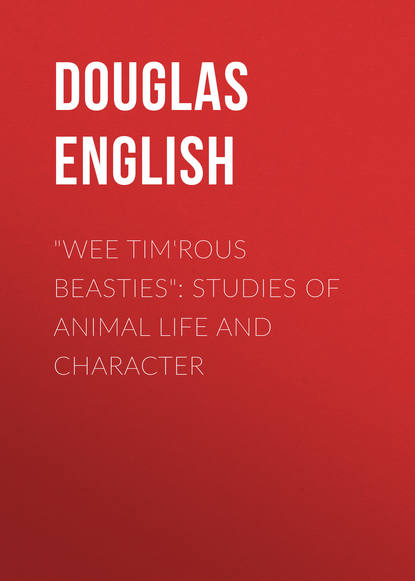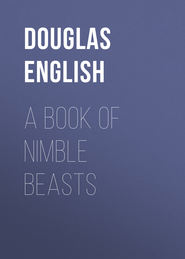По всем вопросам обращайтесь на: info@litportal.ru
(©) 2003-2024.
✖
"Wee Tim'rous Beasties": Studies of Animal life and Character
Настройки чтения
Размер шрифта
Высота строк
Поля
MOST OF THEM FLING THEIR HEADS BACK, ARCH THEIR NECKS, AND PLAY AT BEING SNAKES.
The caterpillars were studying moral invisibility in a hundred different ways, for insect life is the most highly specialized of all. It was the lobster-moth-to-be that spoke first. He bent his head backwards until it touched his tail, folded the knee-joints of his skinny legs, and began—
“It is all bluff,” said he, “caterpillars are past-masters of bluff. Look at the hawkmoths, fat, flabby, bloated things, with curly tails. Most of them fling their heads back, arch their necks, and play at being snakes. Some grow eyes upon them, not real eyes, but markings which serve as such, enough to scare the average chuckle-headed bird. Sometimes they trust to vein-markings on their bodies, which turn them into casual misshapen leaves. Sometimes they liken themselves to twigs—”
“That is what we do,” cried the loopers. Each branch of the oak had its loopers, feeding cheerfully, transforming themselves to twigs, and shamming death in quick succession.
NOT REAL EYES BUT MARKINGS WHICH SERVE AS SUCH.
“Sometimes,” continued the lobster-moth-to-be, “they are, like myself, really worth eating. Then, mere vulgar imitation bluff is of little avail. To be a withered leaf is my first line of defence; if the ichneumon buzzes nearer, I shift my ground and become a spider. I am the only caterpillar in the country with spider-legs; when they are stretched to their full length and quivering, they are worse to look at than the real thing. Should even this fail me, I show the imitation scar on my fourth body-ring. That usually clinches the matter. The ichneumon fondly imagines that I am already occupied. So, if I am lucky, I turn at length to dingy pupa, and thus preserve my race.”
“Will you hear an amphibian?” said the toad. He came from the centre of a grass-tuft, and spoke with solemn deliberation. “Not one of you is more persecuted than I. From time immemorial I have been the loadstone of credulity, and—I am altogether defenceless. I am never worth eating, for the shock of capture opens every pore on my skin, drenching me with what the poets class as venom. So I am usually thrown aside with a broken back. For centuries I was thought to have a jewel in my head. How many of my hapless ancestors were tortured for that jewel! With the toad’s death, the jewel was believed to vanish. How many have been ‘larned to be a toad’ by baffled, disappointed rustics! That is what puts the sad expression in my eye. How have I survived it all? By dogged perseverance. I lay so many eggs that one at least must survive. Thus is the balance of the race preserved. I myself was one of five hundred, the only one that reached maturity. Yet all were in the same long ribbon coil. The swan that gulped the coil, gulped all but me. I dropped into the brook alone, and there I quietly passed through my novitiate, egg to tadpole, tadpole to toadling, toadling to toad. When my tail was absorbed into my body, I sought a land-retreat. There I have spent my time for twenty years. None of you know it, and none ever will. I leave it only at twilight, and, as you pass, I shield my face with my fore feet. Froggin is much the same; nothing but his prolific quality saves him.”
EACH BRANCH OF THE OAK HAD ITS LOOPERS.
“WILL YOU HEAR AN AMPHIBIAN?” SAID THE TOAD.
“Froggin is at least worth eating,” said the grass-snake. He lay with all his four-foot length displayed in graceful sinuous curves, and was listened to in silence. Nothing loves a snake, however harmless. “With me, as with the caterpillars, it is mostly bluff. I can swing back my head, and flatten the nape of my neck, as well as any deadly adder. I can also strike, but there is no poison behind the blow. My only weapon of offence is smell, a sickening musty smell, that makes the enemy loose his hold. Once I am halfway down a hole, I’m safe. I set my ratchet scales against the sides, and nothing can dislodge me. Only a jerk is dangerous, and that must be accomplished before I am fairly fixed.”
“I am armour-clad,” said the stag-beetle. “Could there be better method of defence? Look at the sliding joints of my breastplate. Human skill has copied it, but never has surpassed it. My horns look formidable, but for offence are useless. They are far from my eyes, and move but slowly. Give me time, and I can crush a tender twig between them, and suck its juices. That is all the purpose they serve me, yet they look like branching antlers, and that also is something.”
“FROGGIN IS AT LEAST WORTH EATING,” SAID THE GRASS-SNAKE.
“I AM ARMOUR-CLAD,” SAID THE STAG-BEETLE.
“I have heard you all,” said the hedgehog. “I have heard the flier’s point of view from the bat, the gymnast’s point of view from the squirrel, the swimmer’s point of view from the water-rat, and the assassin’s point of view from the stoat.” For a moment he coiled himself up with a snap, but the stoat made no remark, so he slowly uncoiled himself, and resumed. “Yet I maintain my original contention, there is nothing like spines. ‘The fox’s tricks are many; one is enough for the urchin.’ What is the one unfailing, all-sufficing trick? The proper and judicious use of spines. All of you would use spines if you could. Most of you do. Think of the bramble-thickets, think of the furze, the last resort of valiant stoat and viper, think of the holly, where the sparrows roost.
“Spines are the proved asylum of the spineless. Nature has flung them broadcast. She starts low down among the plants, thorn and thistle, gorse and cactus. Then she turns to the sea-urchins and caterpillars and beetles, then she fashions the globe-fish and thorny devil-lizard, then she comes to the birds—spikes are their only weapons—lastly, in me and mine, she reaches the fulness of perfection.
“Think of the purposes spines serve me. Which of you defies the fox or terrier in the open? I leave the fliers out—running away is not defence. To me a fight is child’s play. The more inquisitive my foe, the tighter do I clinch myself together. They get more harm than I do.”
The last few words were spoken from within. The stoat approached gingerly, and turned the hedgehog over, seeking for a place to jump at. The bat wheeled across him, and swerved at the suspicion of those rigid spears. The caterpillars betook themselves once more to feeding. The water-rat slipped quietly down the stream,—she still feared the stoat. The squirrel ran openly down his tree-trunk, and secretly up the far side of it. The fear of the stoat was on him too. So the moon rose, and, for most, the chance of sport that night passed away.
The hedgehog remained coiled for an hour. Then he shambled away, well satisfied. First he eat two pheasant eggs, then a belated frog, and then a nestling blackbird. As the sun mounted the eastern sky he once more sought the pile of leaves that lay against the hen-house.
THE END






